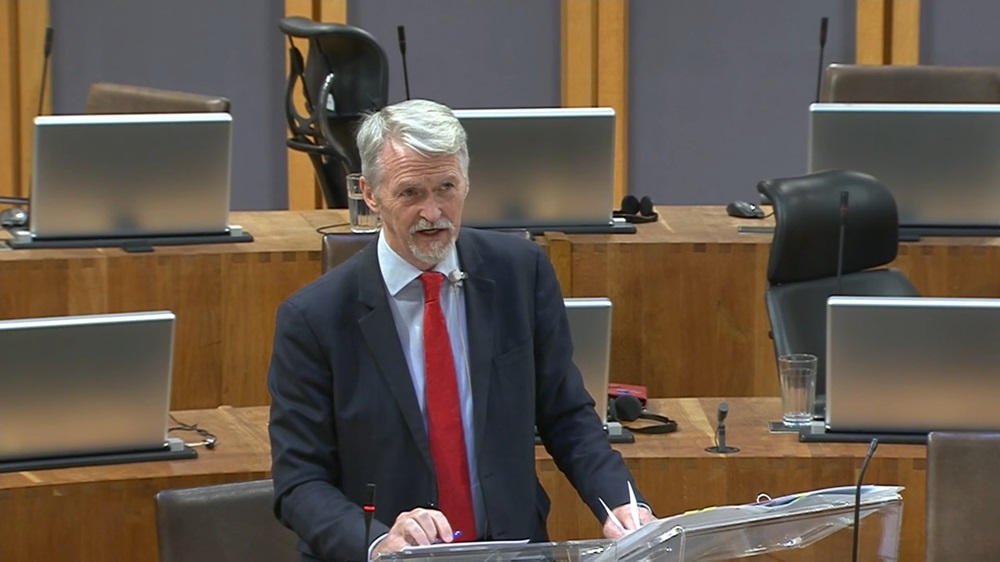UK Government’s new water legislation will apply to Wales

The climate change secretary has confirmed proposed UK water legislation will apply to Wales despite concerns about lawmaking being “outsourced” to Westminster.
Huw Irranca-Davies, who is also Wales’ new deputy first minister, told the Senedd he has agreed that the UK Government’s water bill be extended to Wales.
The bill aims to ensure water companies are held to account, with increased enforcement powers for regulators and tougher penalties, including imprisonment.
Mr Irranca-Davies said the bill will grant the regulator, Ofwat, powers to limit bonuses paid to executives and allow Natural Resources Wales to recover costs from water firms.
He accepted changes to the law must reflect Wales’ needs as he committed to working with the UK Department for Environment, Food and Rural Affairs (Defra).
‘Outsourcing’
But former Plaid Cymru leader Adam Price pointed out that in a previous incarnation as chair of the legislation committee, Mr Irranca-Davies took a different position.
Questioning the climate change minister, Mr Price said: “You often eloquently made the case for us not outsourcing legislation to Westminster but legislating ourselves here.
“Maybe you could explain … why you’ve failed to persuade yourself of that former case.”
Mr Price called for a root-and-branch review of the governance model for Wales’ water industry, with the climate change secretary suggesting this is not high on the agenda.
Mr Irranca-Davies joked: “On your point of my unusual conversion to actually supporting us being involved in collaborating … you must have been referring to my twin brother, I think.”
The former MP and Defra minister said the Senedd may not have the opportunity to legislate for four or five years, so it was important to seize the opportunity.
But he admitted: “I realise I’m a bit of a poacher-turned-gamekeeper on this.”
‘Excuse’
Janet Finch-Saunders, the Conservatives’ shadow climate change secretary, raised concerns that Wales could miss out on revenue raised by fines.
She said: “If a company, for either land pollution, noise pollution or water pollution, if they’re fined, that money goes into the UK Treasury.
“And that’s always been used by the Welsh Government as an excuse, almost, that we don’t have the money to clean up our polluted rivers.”
Ms Finch-Saunders, who represents Aberconwy, stressed: “If the pollution has taken place in Wales, we should have that money here in Wales to help clean up afterwards.”
Responding to the statement on September 17, she warned of an environmental crisis with six of the UK’s most polluted rivers in Wales.
She said: “Warnings were issued only this summer for people not to go swimming or in the sea due to poor water quality at 25 Welsh beaches.”
‘Powerless’
Delyth Jewell, Plaid Cymru’s shadow climate change secretary, warned the public continues to feel powerless on the issue of sewage in Wales’ waterways.
She said: “The public deserves more than mere promises of improvement.
“They need to see action and, if necessary, stiff penalties imposed on those companies that fail to reach adequate standards time and time again.”
She reiterated her party’s calls for full devolution of powers over Wales’ water resources.
Ms Jewell, who is the Plaid Cymru group’s deputy leader, also called for action on microplastic pollution which can pose a threat to people’s health.
“These particles have been found in human lungs, breast milk and blood,” she said. “So, what specific steps will be taken to improve monitoring and enforcement with regard to water companies when their practices contribute to plastic and microplastic pollution?”
‘Alarming’
Mike Hedges, who represents Swansea East, also raised concerns about research showing “alarming” levels of microplastics in UK rivers.
The Labour MS suggested monitoring riverbeds for microplastic content could be an effective way to police water companies’ practices.
Carolyn Thomas, a fellow Labour backbencher, pointed out that many rivers cross Wales’ border, exemplifying the need to work with the UK Government.
The Conservatives’ Laura Anne Jones called for a ban on combined sewage outflows, “which allow water companies to pump sewage into the rivers”.
She told the chamber: “I grew up fishing and swimming in the River Usk, and I want my children and others to be able to do so.
“My children do now but it does make me wince a bit, knowing what’s coming into our rivers, with visible sewage more and more prevalent, unfortunately.”
Support our Nation today
For the price of a cup of coffee a month you can help us create an independent, not-for-profit, national news service for the people of Wales, by the people of Wales.






Copy and paste legislation. No opportunity to even tweak and make appropriate to a Welsh context? Is this what is ment by two Labour governments at both ends of the M4? Will there be more legislation like this in the near future?
Another attack on Welsh devolution. So those shared water powers weren’t worth the perforated paper written on? If English Labour can override the will of the Senedd they can also ape the Conservatives and force another day valley to be flooded to supply the Home Counties with Welsh water. Think that’s outlandish? It’s Already happening. English water companies are networking our water through English rivers from reservoirs in Wales to the South East to quench their thirst at our expense. Pity clueless former FM Carwyn Jones repelled the Welsh Law protecting the sanctity of devolution when Theresa May swerttalked him… Read more »
According to Feargal Sharkey ” the Govt’s new water bill does indeed give ministers the power to not only force customers to pay for @thameswater
‘s bailout via increased bills (or any other water company for that matter), but also to payoff the bondholders, shareholders, creditors or “any other financial obligation”. It looks like if the Welsh Goverment by adopting this legislation will be imposing additional cost burden on Welsh customers – looking out for the Industry rather than the customers – again big industry prioritised over customers.